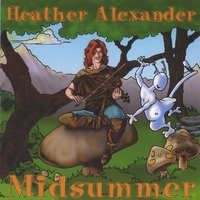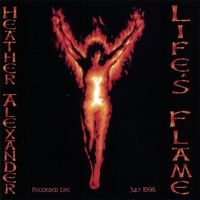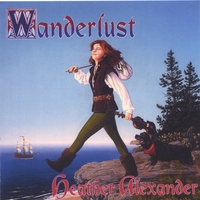

 Wanderlust (Sea Fire Productions, 1994)
Wanderlust (Sea Fire Productions, 1994)
Life’s Flame (Sea Fire Productions, 1996)
Midsummer (Sea Fire Productions, 1997)
This isn’t an easy set of reviews to write. You see, though Ms. Alexander doesn’t know it, her music and I have something of a history. It all dates back to high school, I’d say. I was young, foolish, and going mad with boredom. I was still discovering just what sorts of literature truly appealed to me, and as an indirect result, what kinds of music. Through sheer random chance, I stumbled across Mercedes Lackey’s first book, Arrows of the Queen. That in turn lead me to discover the musical paradise that is Firebird Arts and Music, who at the time distributed a lot of Mercedes-related books, music, art, and god-knows-what-else. Somehow, I forget exactly how, I found myself with this driving thirst for all things Celtic, especially music. And for the next few years, Christmas and birthdays were easy: just circle desired items in the Firebird Arts catalogue, give to mother, sit back and wait.
In such a fashion was I introduced to the phenomenal talent of Heather Alexander, then working with an absolutely to-die-for group led Phoenyx. They were a Celtic fusion group, and their one and only release, Keepers of the Flame, knocked me over and blew me away. For years, that tape was my single favorite piece of music, and I still possess it around here somewhere, which is good since it’s been out of print for a sadly long time. The tape was released in 1990, and the group broke up in 1991, just to give you a sense of chronology. Ever since, Heather Alexander has been entertaining primarily as a solo performer.
In the meantime, I had this one tape, which kept me company through the end of high school, and into college. Such was my regard for it, that I played it for a certain lady friend… and clearly, she didn’t appreciate it, breaking up with me a month later. Ah well. Some people just don’t appreciate quality.
Time passed, and I grew away from my Celtic music obsessions, and stopped ordering from Firebird as regularly. But I never forgot, in the back of my mind, the music that had set my imagination on fire. When I was offered the chance to review not one, but all three of Heather Alexander’s solo albums, I leapt at the chance. And was then so intimidated at trying to find words to describe someone I admired and enjoyed so much, that I hid under a rock with the three CDs, hoping no one would remember I had them. Well, someone did, and so here I am, and here are the CDs, and it’s time to put my thoughts to words.
What’s Heather Alexander’s style like? It’s unashamedly Celtic, unabashedly energetic, unstoppably powerful. Alone and with friends, her music is apt to bowl the listener over if they’re not prepared. Her voice ranges from sultry to slamming, from seductive to stunning, hypnotic and sizzling all in one. She’s the sort of performer who throws herself completely into every song, adopting a new identity for every occasion. Trying to capture the range of her voice is like bottling the wind. It’s haunting, the kind of voice that sticks with you. Years after the fact, I could still call up a mental picture of Heather singing “The March of Cambreadth” in all its glory.
Heather is a musician of many talents. In her various albums, she’s listed as performing vocals, guitar, fiddle, mandolin, bodhran, generic percussion, electric fiddle, faerie bells, and violin. Whew! I can barely tap out “Shave and a Haircut” with two fingers! Heather is a performer with many friends. Even after leaving Phoenyx behind, she’s still worked with any number of musicians. For Midsummer, she’s backed by Brett Barnett (keyboards), Rob Wullenjohn (bass), Warren Casey (Macedonian Tapan), John MacAdams (snare drum), Aaron Shaw (Highland pipes) and the vocals of the “Cambreadth Chorus”. On Wanderlust she reels in Rob Wullenjohn (bass), Tempest’s Lief Sorbye (flute) and Jenny Lindner (harp). She’s worked with, or opened for, Tempest, Tommy Makem, The Clancy Brothers, Tom May, Darby O’Gill, and the Wicked Tinkers.
Heather is a creative genius, having blended traditional Celtic, modern instruments, rock and roll, and original compositions to create something that’s mercurial and chimerical, old and new. She’s whimsical and powerful, playful and serious. While at one point she seemed to be more of a filker than a folker (filk music is often inspired by science fiction or fantasy, and parodies more established tunes. See the incomparable Tom Smith for a classic example of this), she has outright stated that she is first and foremost a musician, and a Celtic musician in specific. However, I’m not sure -anything- on Earth can truly explain “Faerie Queen,” which is essentially Tam Lin meets “The Devil Went Down To Georgia.” (My comment: Oh my GOD! Can she DO that?) This song inspired a truly terrifying filk of its own, “The Faerie Queen Went Down To Georgia,” written by a crazy filker who in turn is an evil friend of an insane blonde I know, and thus do we play the twisted Six Degrees Of My World, thank you for playing, Jane, stop this crazy thing!
Digressions aside, what we have then is a truly fantastic musician, who could give the Devil a run for his money where fiddling is concerned, and voice lessons to the Fae. (Having compared her thus, she’d better watch out for mysterious strangers offering challenges…) I’m not sure if I can even distinguish between Life’s Flame, Midsummer, and Wanderlust, but I’ll try.
Wanderlust is notable for having the aforementioned “Faerie Queen,” which is over seven minutes of ass kicking, foot stomping, mind blowing fiddle, defiant vocals, pounding bodhran, and pedal-to-the-metal music at its best. It exemplifies everything I look for in the Faster, Harder, Louder style of music. Turn it up and watch the cats flee. It took me three repetitions before I could tear myself away for the rest of the album. Then there’s “Storyteller,” which is a beautiful tribute to one of the greatest storytellers of all time, Jim Henson. For this, Heather switches from defiant and challenging, to haunting and atmospheric. It’s alternately a plea for magic, and a celebration of everything Jim Henson meant to generations of people.
“Stolen Child,” by comparison, is a straight adaptation of the William Butler Yeats work of the same name, put to music once again. This is one of the quintessential, perfect Faerie poems, and Heather captures that fey, mysterious, otherworldly, yearning quality dead-on, invoking moonlight and mists, and magically alien creatures.
“John Barleycorn-Drowsy Maggie-Unfortunate Rake” is that best of all songs: one you can drink, sing, and dance to. So raise your ale, and do a few steps, and honor John Barleycorn, whose travels and travails gave us that drink of the gods. If that’s too tame for you, try “Pour Your Brother,” a drinking song Heather whipped up “for when things got really silly and rowdy.” I suspect our esteemed editor listens to this one regularly, judging by the revels he often describes. It’s certainly one to make you move and get a bit wild.
“An Sceal” and “ContrariDance” are a linked pair of performances. The first is a spoken word tale spun by Heather in true storyteller fashion. She changes voice, switches inflections, and weaves a tale of goblins wanting to dance with the faeries so smoothly and beautifully that it pops right into the mind. It’s very evocative of “The Dark Crystal,” and I fear the day when Brian Froud gets inspired by this tale. “ContrariDance” is the musical version of the tale, retelling it in pure instrumental terms.
“Neverland” is the rallying cry of a certain insane Californian blonde I know. If it’s not, it should be. It’s a challenge against the real world, a defiance against all that’s grown-up and normal and dull and banal. It’s a declaration of war between the imagination and the everyday world, and it’s easy to picture Heather Alexander spearheading a campaign to free us all from those nasty mind numbing 9-5 jobs. “Raise A Glass” is one of those ideal parting shots, raising both drink and song to good company and new friends.
It’s the mark of a good album when you’re reluctant to switch it out for another, and indeed, I had to make myself get up to switch out Wanderlust for Midsummer. However, I managed to do so, with no trauma induced. And I’m all the better for it, for Heather maintains every ounce of skill and range of performance. This album is most notable for having the song that stuck with me all through the years, from Keepers of the Flame and onward, “The March of Cambreadth.” With the recurring line of “How Many of Them Can We Make Die!” it’s nothing short of an all out rally to fight. It’s a war song, plain and simple, bagpipes and drums and defiance all the way. Powerful, loud, and strong, it’s the kind of song you turn up to annoy the neighbors and declare war on neighboring countries.
Pardon me while I go regain my hearing. I think I heard the windows rattle. Sadly, Midsummer doesn’t have the same expansive liner notes that Wanderlust did, so I can’t tell you as much about the songs. I can, however, assure you that they are every bit as magical, protean, and enjoyable. “The Hunt Is On” is triumphant and bold, full of fanfares. “Brannigan’s Special Ale” is another one of those lively, irreverent drinking songs, full of laughter and joy. “Midsummer” is playful and jaunty, the theme song for Puck from “A Midsummer Night’s Dream” in all his impish, capricious glory. (I’m listening to this, and damned if I’m not seeing Puck in a tuxedo, backed up by a trio of very slinky faeries in even slinkier dresses in one of those Vegas numbers… sort of a faerie bump and grind…) (Word of warning: it worries the cats when I try to dance…)
Finally, last but by no means least is Life’s Flame which I’ve saved for last only because it’s a bit different from the other two. This is more of a live album, done with an audience in the background for that immediate reaction effect. It opens up with Heather telling the story behind “Eggs and Crumbs,” before moving into the song itself. It’s the traditional tale of finding a changeling in place of a baby, and the unorthodox method in which one woman must force the changeling to reveal its true nature and return her child. This showcases Heather’s storytelling skills, and her playful side. The glee she takes in the voices and the comedic value of the story is tangible, and thoroughly delightful. “Cat and the Fiddle” is, you guessed it, kind of about the cat and the fiddle, but also about a musician on a corner, and the magic they bring to their listeners. Very lively, self aware, and wry.
Then we have the introduction to, and the song of “Black Jack’s Lady.” It’s the mirror song to the tale of Black Jack Davy, a popular traditional tune in its own right. This, though, is the big question of “what happens when Black Jack Davy leaves the lady behind, the cad?” The answer: The lady, a redhead, is rightfully pissed and out for revenge… Ooops. Hell hath no fury like that of a redhead scorned. This is entirely typical of Heather’s ability to take old songs and turn them on their ear for an entirely different result.
“Samhain” tears away the veils between one world and the next on the most mystical day of the year, when ghosts and things best left unspoken come closest to the world of the living. Spectral, haunting, and chilling in turn, it’s another example of Heather’s amazing versatility.
The title track, “Life’s Flame,” is the anthem of a phoenix, all about life and death and life again. When a falconer finds a wounded bird, he learns quickly that his destiny involves fire, and the bird is much more than it seems. “Hap’n’ Frog” is another one of those playful, impish songs that bespeaks of wry humor and not-so-subtle irreverence. Heather goes all-put with the silly voices and laughter in her voice for this one, defiantly changing the mood after the previous songs.
“Creature of the Wood,” on the other hand, is dark and mysterious, dangerous and seductive. It’s the satyr in the woods, the temptation of the Pan, the secret thrill of the unknown and the shadows. It’s every unsuitable man, every forbidden joy, and every dangerous liaison, rolled into one cloven-hoofed bad boy.
“Lifetime of Song” wraps up the album in true Heather Alexander style, dedicated to her listeners. It’s a quiet celebration of music and magic, and the musician’s craft, and the storyteller’s art. It leaves things on a high note.
What more can I say about Heather Alexander and her work? It’s some of the best music, Celtic or otherwise, I’ve ever come across. If you have any appreciation for Celtic music, this is for you. If you must pick just one, start with Wanderlust, but otherwise, any of the three are equally superb.
(Note: This review was written long before Heather Alexander transitioned from female to male, and became Alexander James Adams. For the sake of historical accuracy in these archives, I’ve chosen to leave the review as it originally appeared, with all due respect to the artist, past, present and future.)
